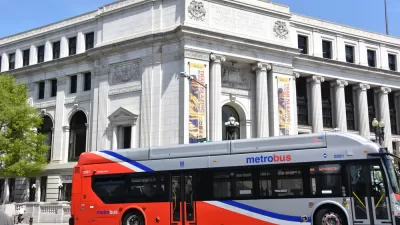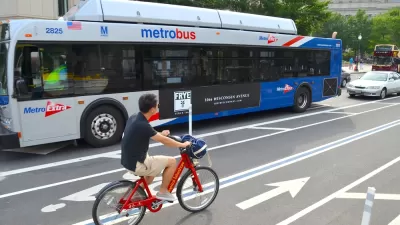Regular bus riders know how integral an accurate real-time bus arrival system can be to the experience of bus transit. D.C. Metro just made a switch in technology, and Greater Greater Washington evaluated the results (so far).

Tracy Hadden Loh reports on the results of an audit by Greater Greater Washington staff members of the new bus arrival estimation system at work for the Washington Metropolitan Area Transit Authority (WMATA).
WMATA implemented the new bus estimation system, BusETA, earlier this month, replacing the NextBus system it had operated for seven years previously. Hadden Loh sums up the audit thusly: " Overall, the system performed well enough, but buses sometimes came earlier than predicted, and "ghost buses" are still real."
The audit revealed some of the tendencies of the new system, including several instances of buses arriving before the predicted arrival time. As Hadden Loh explains, "this is a major problem, because when you miss a bus by only one or two minutes, you have to wait the entire headway of the bus line for the next one, which is the worst-case delay scenario."
The audit's final verdict, however, is that BusETA's use of the open source OneBusAway project, also used by Atlanta and New York "should promote innovation and help interested parties understand how and why various prediction apps are working."
FULL STORY: Metro's new bus prediction system is pretty accurate, but leave yourself some extra time

Planetizen Federal Action Tracker
A weekly monitor of how Trump’s orders and actions are impacting planners and planning in America.

Congressman Proposes Bill to Rename DC Metro “Trump Train”
The Make Autorail Great Again Act would withhold federal funding to the system until the Washington Metropolitan Area Transit Authority (WMATA), rebrands as the Washington Metropolitan Authority for Greater Access (WMAGA).

The Simple Legislative Tool Transforming Vacant Downtowns
In California, Michigan and Georgia, an easy win is bringing dollars — and delight — back to city centers.

The States Losing Rural Delivery Rooms at an Alarming Pace
In some states, as few as 9% of rural hospitals still deliver babies. As a result, rising pre-term births, no adequate pre-term care and "harrowing" close calls are a growing reality.

The Small South Asian Republic Going all in on EVs
Thanks to one simple policy change less than five years ago, 65% of new cars in this Himalayan country are now electric.

DC Backpedals on Bike Lane Protection, Swaps Barriers for Paint
Citing aesthetic concerns, the city is removing the concrete barriers and flexposts that once separated Arizona Avenue cyclists from motor vehicles.
Urban Design for Planners 1: Software Tools
This six-course series explores essential urban design concepts using open source software and equips planners with the tools they need to participate fully in the urban design process.
Planning for Universal Design
Learn the tools for implementing Universal Design in planning regulations.
Smith Gee Studio
City of Charlotte
City of Camden Redevelopment Agency
City of Astoria
Transportation Research & Education Center (TREC) at Portland State University
US High Speed Rail Association
City of Camden Redevelopment Agency
Municipality of Princeton (NJ)




























